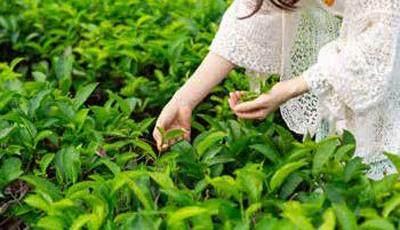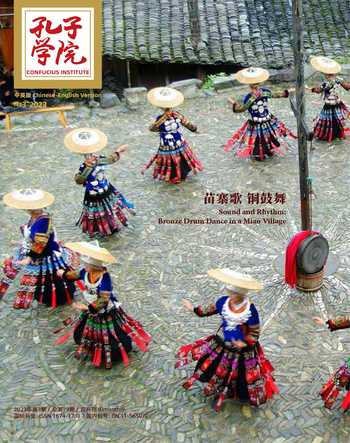二十四节气之清明和谷雨
2023-11-18雪漫
雪漫


清明一般在仲春與暮春之交,公历4月5日前后。清明既是节气,也是节日。清明节是中华民族的重大传统节日,扫墓祭祖与踏青郊游是清明节的两大礼俗主题,自古至今,传承不辍。
清明节是中国人最隆重的祭祖的日子。扫墓,俗称“上坟”,源自上古时代的祖先信仰与春祭礼俗,是一种礼敬祖先、慎终追远的文化传承。在汉族和一些少数民族地区,人们按照当地的风俗习惯,带上水果、食品和纸钱等到墓地,把供品摆放在墓碑前,将纸钱焚化,清理布置墓碑,或为坟墓添一些新土,然后在墓前磕头、鞠躬。现在随着墓葬方式和拜祭方式的改变,有人开始在阿上祭拜。
清明节前后,万物“吐故纳新”,阳气生发,正是亲近自然、享受春天乐趣、愉悦身心的好时节。放风筝是清明节期间许多中国人喜欢的活动。这一天放风筝的特别之处在于,当风筝飞在空中时人们会剪断风筝线,让它自由飞翔。据说这样做可以带来好运,驱除疾病。
此外,在长江下游地区,青团和青糕是清明节非常受欢迎的小吃。人们将稗草捣碎榨汁,然后将面粉和汁液混台成糊状,再将黑豆馅揉进面糊中并蒸熟。青团漂亮精致、口感醇厚、风味独特,在清明节也被用来祭祀祖先。
关于清明的诗词,除了家喻户晓的唐朝杜牧的“清明时节雨纷纷,路上行人欲断魂。借问酒家何处有?牧童遥指杏花村”,还有北宋欧阳修的《采桑子》组词中的一首,描绘了清明时节颍州(今安徽阜阳)西湖踏青之景,人欢景艳,满目繁华,颇为动人。
清明上已西湖好,
满目繁华。
争道谁家,
绿柳朱轮走钿车。
游人日暮相将去,
醒醉喧哗。
路转堤斜,
直到城头总是花。
谷雨是春季最后一个节气。今年的谷雨在公历4月20日。此时寒潮天气基本结束,气温回升加快,有利于谷类农作物的生长。谷雨意为“雨生百谷”,故有“春雨贵如油”之谚。此时降水明显增加,要及时春播,作物新种和谷类方能得到雨水滋润,进而茁壮成长。时不我待,故民间有“谷雨前后种瓜种豆”之说。
在谷雨节气,新茶已出,牡丹盛开,故民间有“品谷雨茶”“赏牡丹花”等习俗。在南方,谷雨前的新茶格外受欢迎。据说喝了谷雨天采摘的茶,可以降火、明目、辟邪。在山东、四川、河南等地,则有“谷雨三朝看牡丹”的习俗。各地举办牡丹赏花会,人们在花海中感受花香以及满满的春季气息。在北方,还有谷雨吃香椿的习俗。香椿具有消炎、健胃、理气、润肤、抗菌、提高身体免疫力等功效。此时的香椿,鲜嫩可口,营养价值高,有“雨前香椿嫩如丝”的说法。此外,北方沿海—带的渔民会在谷雨节气进行祈福,祈祷捕鱼丰收,出海平安。后来,这种祈福活动逐渐变成了祭海,渔民要向海神娘娘敬酒后再出海捕鱼。
每年的谷雨日,也是“联合国中文日”,或叫“国际中文日”。2010年,联合国新闻部(现全球传播部)宣布启动联合国语言日。同年,将中文日定为每年4月20日中国传统节气“谷雨”这一天。每到这一天,联合国各处办公地都会举办各种庆祝活动,全球的孔子学院或华人机构也会举办话动,展示中国汉字的魅力和中国文化。
关于谷雨的诗词,南宋范成大的《蝶恋花》则写出了春耕之后对收获的期许。
春涨一篱添水面。芳草鹅儿,绿满微风岸。
画舫夷犹湾百转。横塘塔近依前远。
江国多寒农事晚。村北村南,谷雨才耕遍。
秀麦连冈桑叶贱。看看尝面收新茧。
诗中描绘出一幅春意盎然的画面:春来了,绿水新涨,涨平了水面。水边芳草嫩绿如茵,鹅在水中游动,画船移动绕着九曲水湾游转,远处高塔依旧。江南水乡春寒迟迟,农事也晚,谷雨时才将农田耕种一遍。此时春麦已结穗,随风连成片,山上桑树茂盛,转眼就可以品尝新面,收取新茧。
Twenty-four Solar Terms
Qingming
Qingming, or Tomb Sweeping Day, usuallytakes place during the early or late spring,typically around April 5th in the Gregoriancalendar. It holds signi cance as both a solarterm and a traditional festival. Qingming has been celebrated by the Chinese people forcenturies, and the customs of tomb sweepingand spring outing have been passed down from ancient times to the present.
The Qingming Festival is the most solemnday for Chinese people to pay theirrespects to their ancestors. Tomb sweeping,o en referred to as “visiting the graves”, hasits roots in ancient ancestor worship andspring rituals. It serves as a cultural heritage,allowing people to honor their ancestors andcherish their memory. In Han and certainethnic minority regions, people adhere tolocal customs by bringing fruits, food, andpaper money to the cemetery. These o eringsare placed in front of the tombstone, andafter burning the paper money, the tombstoneis cleaned and decorated. Some freshsoil is added to the grave, and nally, peoplekowtow before the tomb. With the evolutionof burial practices and worship traditions,some people have even begun to worshiptheir ancestors online.
Additionally, during the Qingming Festival, thereis a sense of rejuvenation and the ourishing of positiveenergy. It is a wonderful time to reconnect with nature,revel in the delights of spring, and experience joy andrelaxation. One popular activity among many Chinesepeople during this festival is flying kites. What makeskite-flying on this day special is the practice of cuttingthe kite strings while the kite is airborne, allowing it tosoar freely. It is believed that this act brings good luckand wards o illnesses.
Moreover, in the regions downstream of the YangtzeRiver, Qingtuan (green rice ball) and Qinggao (greencake) are beloved snacks during the Qingming Festival.People crush barnyard grass and extract its juice, then mixthe juice with flour to create a paste-like mixture. Theythen knead black bean paste into the dough and steam ituntil cooked. Qingtuan is beautifully cra ed, with a richand mellow taste and a distinctive avor. It is also used toworship ancestors during the Qingming Festival.
When it comes to Qingming, apart fromthe well-known Tang Dynasty poem by Du Mu,“Amidst the drizzle in the Qingming season, onthe road, travelers’ souls seem to wane. May Iask where to nd an inn so near? A shepherdboy points to Apricot Blossom Lane.” Thereis also “Cai Sang Zi” by Ouyang Xiu from theNorthern Song Dynasty. This piece depicts thevibrant scene of the Qingming Festival at WestLake, with its joyful people and magnificentlandscapes, truly captivating the hearts of thosewho witness it.
On the day of the Double Third Festival at
West Lake,
a sight of bustling magnificence is splendid.
Whose family competes for the road,
carriages with red wheels and filigree patterns
pass under green willows.
As the visitors depart at dusk,
awake or drunk, clamor fills the air.
The road turns, the embankment slants,
until reaching the city walls, flowers are ever
abundant.
Guyu
Guyu, or Grain Rain, the last solar term ofspring, began on April 20th this year. As coldweather wanes and temperatures rise, it is now agood time to grow crops. The Chinese people believethat “the rain rings up hundreds of grains”, andtherefore there is the Chinese saying that “springrain is as precious as oil”. At this time of year, becauseprecipitation significantly increases, farmersneed to sow their crops timely so that the crops canreceive adequate water and grow vigorously. Hence,people have the saying of “sowing melons and beansbefore and a er Guyu”.
During the Guyu season, new tea comes out,and peonies bloom, so there are customs like “tastingthe Guyu tea” and “admiring peony owers”. Inthe south, new tea picked before Guyu is particularlypopular. It is said that drinking tea collected on arainy day during the Guyu period can reduce fever,clear vision, and dispel evil spirits. In Shandong,Sichuan, Henan, and other places, there is a customof “appreciating peonies during the three days a erGuyu”. Peony ower shows are held in many places,where people can immerse themselves in the fragranceof owers and enjoy the best of spring.
In the north, there is also the custom of eatingChinese toon sprouts during the Guyu period. It is saidthat this seasonal delicacy has the effects of reducinginflammation, invigorating the stomach, regulating qi,moisturizing the skin, resisting bacteria, and enhancingimmunity. The toon sprouts this time of year are fresh,tender, delicious, and have particularly high nutritionalvalue. Therefore, there is also the Chinese saying: “Toonsprouts before Guyu are as delicate as silk.” It is also duringGuyu that shermen along the coast of the north willpray for a good harvest and safe voyage. Gradually, theyhave developed a ceremonial custom, offering wine tothe sea goddess before going out to sea.
“Chinese Language Day” or “International ChineseLanguage Day” of the United Nations also falls on theday of Guyu. In 2010, the News and Media Division(now the Department of Global Communications) ofthe United Nations announced the launch of the UnitedNations Language Day. It is also decided in that yearthat Chinese Language Day would be April 20th, whichcorresponded to the traditional Chinese solar term ofGuyu. On this day, o ces of the United Nations worldwidehold celebrations, and Confucius Institutes or Chineseorganizations around the world also organize activities toshowcase the charm of Chinese characters and Chineseculture.
The Song Dynasty poet Fan Chengdaonce depicted people’s expectations for agood harvest during spring plowing to a tuneof “Butter y in Love with Flowers”:
When the spring floods increase water levels,
the grass sway in the breeze along the shoreline,
where geese jump into the water and swim away.
The gaily-painted boats glide and turn.
On the horizon, now the distant towers stand.
In the water regions of the south, farming
begins late due to the extended chill of spring.
Now it is Grain Rain. All farmers in the village
finally have ploughed up all fields.
Beautiful wheat is in the ear, and mulberry
leaves are abundant and cheap.
Soon the villagers can taste flour made from
the new harvest
and collect cocoons for their silk.
The poem depicts a vivid picture ofspring: when spring comes, the green waterrises, leveling the surface. Fragrant grassgrows thickly, and geese swim in the water.The beautifully-decorated boats move throughtwists and turns of the waterway, withtowers standing in the distance. In the watertowns of southern China, spring plowingis delayed by cold weather, and Guyu is whenthe fields are tilled. By this time, the wheatis maturing, forming golden waves that wa in the wind. Mulberry trees flourish in themountains, and people can soon enjoy new our and collect new cocoons.
